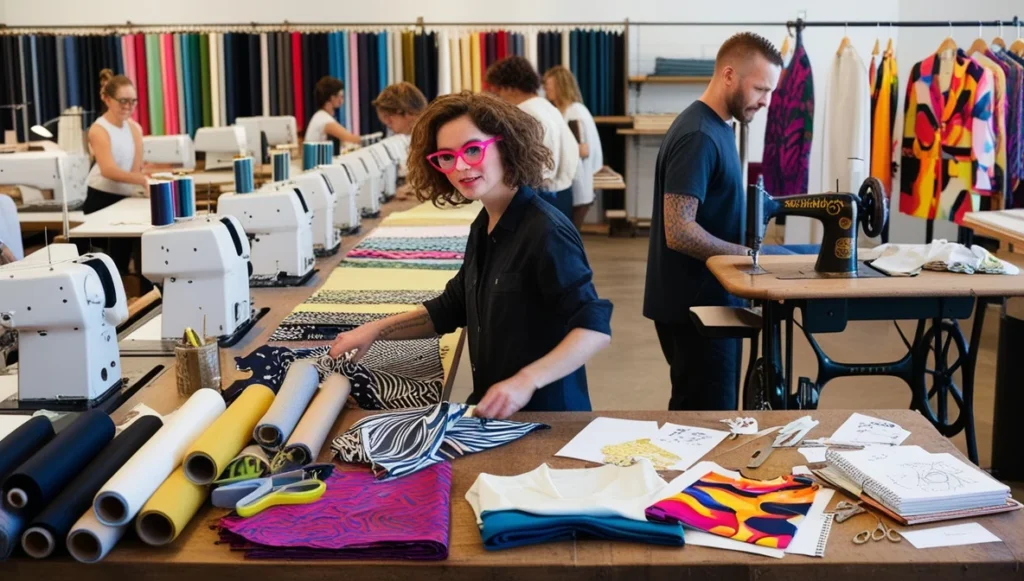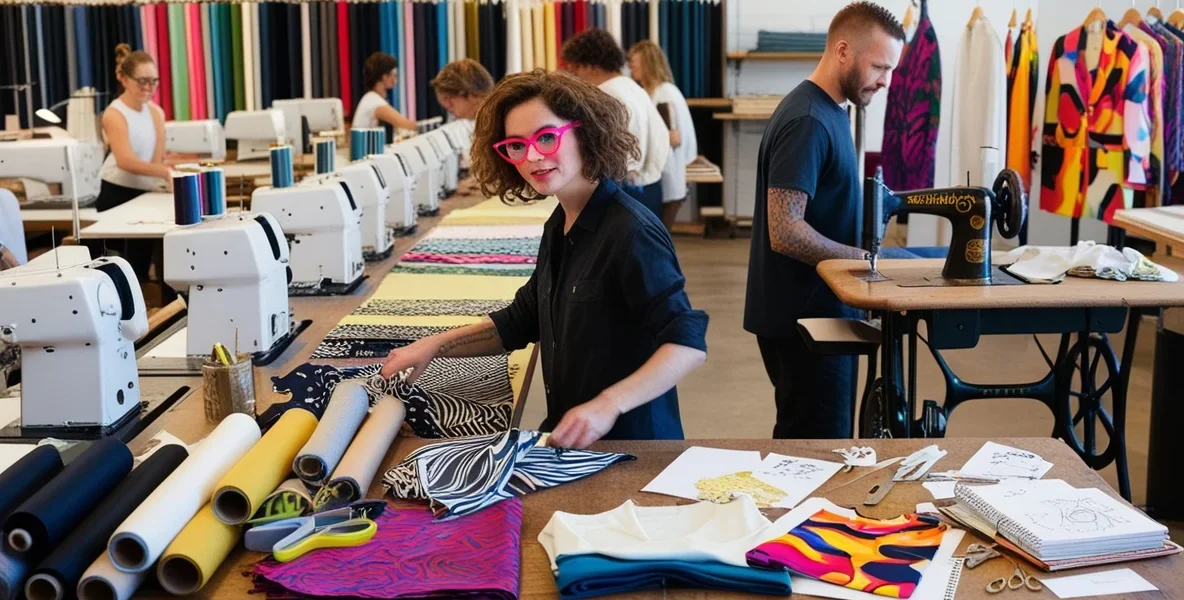Future Fashion Trends: Embracing Small Batch Manufacturing
The fashion industry is undergoing a significant transformation, driven by evolving consumer preferences, technological advancements, and a growing awareness of sustainability. Among the most notable future fashion trends is the shift towards small batch apparel manufacturing. This approach is characterized by producing limited quantities of garments, allowing brands to stay agile and responsive to market demands. As consumers increasingly seek unique, high-quality, and eco-friendly products, small batch manufacturing is poised to become a cornerstone of the fashion industry’s future.

Future fashion trends indicate a growing emphasis on personalization and exclusivity. Small batch manufacturing allows brands to cater to these preferences by offering limited-edition collections that stand out from mass-produced items. This trend also aligns with the rise of direct-to-consumer (DTC) brands, which prioritize customer engagement and feedback to create tailored products. By embracing small batch manufacturing, fashion brands can build stronger connections with their customers and foster brand loyalty small batch apparel manufacturing.
Another key trend shaping the future of fashion is the integration of technology in the design and production process. Innovations such as 3D printing, digital pattern making, and automated cutting systems are revolutionizing small batch manufacturing, enabling brands to create intricate designs with precision and efficiency. These advancements not only enhance the quality of garments but also reduce production time and costs, making small batch manufacturing a viable option for brands of all sizes.
Small Batch Manufacturing: A Revolutionary Approach to Apparel Production
Small batch manufacturing represents a revolutionary shift in the way apparel is produced. Unlike traditional mass production methods, which focus on producing large quantities of identical items, small batch manufacturing emphasizes flexibility, customization, and quality. This approach allows fashion brands to produce smaller quantities of garments, reducing the risk of overproduction and excess inventory. Additionally, small batch manufacturing enables brands to experiment with new designs, materials, and techniques, fostering innovation and creativity within the industry small batch apparel manufacturing.
One of the primary advantages of small batch manufacturing is its ability to respond quickly to market trends and consumer demands. In the fast-paced world of fashion, trends can change rapidly, and brands must be able to adapt to stay relevant. Small batch manufacturing allows brands to produce limited runs of new designs, test their popularity, and make adjustments based on customer feedback. This agility not only helps brands stay ahead of the competition but also minimizes the financial risks associated with large-scale production small batch apparel manufacturing.
Moreover, small batch manufacturing supports the growing demand for customization and personalization in fashion. Consumers today are looking for unique pieces that reflect their individual style, and small batch manufacturing allows brands to offer customized options. Whether it’s through made-to-order garments, limited-edition releases, or personalized details, small batch manufacturing enables brands to meet the diverse needs of their customers and create a more engaging shopping experience.
Sustainable Fashion Trend: The Environmental Benefits of Small Batch Manufacturing
Sustainability has become a critical concern for both consumers and brands in the fashion industry. The sustainable fashion trend is driven by a desire to minimize the environmental impact of apparel production and promote ethical practices. Small batch manufacturing aligns perfectly with this trend, offering several environmental benefits. By producing smaller quantities of garments, brands can reduce waste, lower their carbon footprint, and conserve valuable resources. Moreover, small batch manufacturing often involves using eco-friendly materials and processes, further enhancing the sustainability of the fashion industry small batch apparel manufacturing.
One of the most significant environmental benefits of small batch manufacturing is the reduction of waste. Traditional mass production methods often result in excess inventory and unsold stock, which ultimately ends up in landfills. Small batch manufacturing mitigates this issue by producing garments in limited quantities, ensuring that supply closely matches demand. This approach not only reduces waste but also encourages more thoughtful and intentional consumption.
Additionally, small batch manufacturing supports the use of sustainable materials and practices. Many small batch manufacturers prioritize eco-friendly fabrics, such as organic cotton, recycled polyester, and Tencel, which have a lower environmental impact compared to conventional materials. Furthermore, small batch production often involves more sustainable processes, such as water-saving dyeing techniques and energy-efficient machinery. By adopting these practices, fashion brands can significantly reduce their environmental footprint and contribute to a more sustainable industrysmall batch apparel manufacturing.
Ethical labor practices are another important aspect of the sustainable fashion trend. Small batch manufacturing often involves working with local artisans and small-scale producers, ensuring fair wages and safe working conditions. This approach not only supports ethical labor practices but also helps preserve traditional craftsmanship and skills. By prioritizing ethical production, small batch manufacturing fosters a more transparent and responsible fashion industry.
Small Batch Fashion: Catering to the Demand for Unique and High-Quality Apparel
In today’s fashion landscape, consumers are increasingly seeking unique and high-quality apparel that reflects their personal style and values. Small batch fashion caters to this demand by offering limited-edition garments that stand out from mass-produced items. This approach allows brands to create exclusive collections that resonate with discerning customers, fostering a sense of exclusivity and desirability. Furthermore, small batch fashion often involves meticulous craftsmanship and attention to detail, resulting in higher-quality products that offer greater value to consumers small batch apparel manufacturing.
One of the key advantages of small batch fashion is the ability to create unique and distinctive designs. By producing garments in limited quantities, brands can experiment with bold and innovative styles that may not be feasible in large-scale production. This creativity and originality appeal to consumers who are looking for something different and special. Small batch fashion allows brands to push the boundaries of design and offer truly unique pieces that capture the imagination of their customers.
Quality is another important factor driving the demand for small batch fashion. Consumers today are increasingly aware of the importance of quality and durability in their clothing. Small batch manufacturing often involves more careful and deliberate production processes, resulting in garments that are made to last. This focus on quality not only enhances the value of the products but also aligns with the growing trend of conscious consumption. By investing in high-quality, long-lasting pieces, consumers can build a more sustainable and thoughtful wardrobe.
Small batch fashion also fosters a deeper connection between brands and their customers. By offering limited-edition collections and personalized options, brands can create a sense of exclusivity and community among their customers. This approach encourages customer loyalty and engagement, as consumers feel a stronger attachment to the brand and its values. Small batch fashion allows brands to build meaningful relationships with their customers and create a more personalized and rewarding shopping experience.
Fashion Industry Innovation: How Small Batch Manufacturing is Driving Change
Innovation is at the heart of the fashion industry’s evolution, and small batch manufacturing is a key driver of this change. By embracing small batch production, fashion brands can experiment with new ideas, technologies, and materials, pushing the boundaries of what is possible in apparel design and production. This innovative approach enables brands to stay ahead of trends, respond quickly to market demands, and differentiate themselves in a competitive landscape. Additionally, small batch manufacturing fosters collaboration between designers, manufacturers, and consumers, creating a more dynamic and responsive fashion ecosystem small batch apparel manufacturing.
One of the most exciting aspects of small batch manufacturing is the integration of cutting-edge technologies. Innovations such as 3D printing, digital pattern making, and automated cutting systems are transforming the way garments are designed and produced. These technologies enable brands to create complex and intricate designs with precision and efficiency, reducing production time and costs. Small batch manufacturing leverages these advancements to offer high-quality, innovative products that stand out in the market.
Collaboration is another key element of innovation in small batch manufacturing. By working closely with designers, manufacturers, and consumers, brands can create a more collaborative and inclusive fashion ecosystem. This approach encourages the exchange of ideas and feedback, leading to more innovative and customer-centric products. Small batch manufacturing fosters a sense of community and partnership, driving continuous improvement and innovation within the industry.
Furthermore, small batch manufacturing supports the exploration of new materials and sustainable practices. As the fashion industry seeks to reduce its environmental impact, there is a growing interest in alternative materials, such as biodegradable fabrics, plant-based dyes, and recycled fibers. Small batch production allows brands to experiment with these materials on a smaller scale, testing their feasibility and performance before committing to larger production runs. This flexibility enables brands to stay at the forefront of sustainable innovation and contribute to a more eco-friendly fashion industry.
Small Batch Apparel Manufacturing: The Future of Fashion
As the fashion industry continues to evolve, small batch apparel manufacturing is emerging as a vital component of its future. This approach offers numerous benefits, including increased flexibility, sustainability, and innovation. By producing limited quantities of garments, brands can reduce waste, lower their environmental impact, and create unique, high-quality products that resonate with consumers. Furthermore, small batch manufacturing allows brands to stay agile and responsive to changing market demands, ensuring their continued success in an ever-evolving industry. As consumers become more conscious of their purchasing decisions and seek out products that align with their values, small batch apparel manufacturing is poised to become the future of fashion small batch apparel manufacturing.
The future of fashion will be shaped by the growing demand for sustainability, personalization, and innovation. Small batch apparel manufacturing aligns with these trends, offering a more sustainable and customer-centric approach to fashion production. By embracing small batch manufacturing, brands can create a more responsible and resilient fashion industry that meets the needs of both consumers and the planet.
In conclusion, small batch apparel manufacturing represents a significant shift in the fashion industry, driven by changing consumer preferences and a growing awareness of sustainability. This approach offers numerous benefits, including reduced waste, higher quality, and greater innovation. As the fashion industry continues to evolve, small batch manufacturing is poised to play a crucial role in shaping its future. By embracing this revolutionary approach, fashion brands can create a more sustainable, inclusive, and innovative industry that meets the needs of today’s discerning consumers.





1 COMMENTS